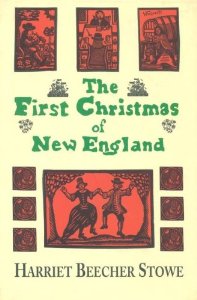Betty's Bright Idea | Harriet Beecher Stowe
|
This a collection of three short stories. In the first, Betty's Bright Idea, a young girl discovers the joy of giving and a poor family's life is turned around. In Deacon Pitkin's Farm, a son sacrifices his education in order to earn the money to pay back his family's mortgage. The First Christmas of New England describes the arrival of the Mayflower pilgrims and their humble but joyful celebrations. |
"When He ascended up on high, He led captivity captive, and gave gifts unto men."—Eph. iv. 8.
Some say that ever, 'gainst that season comes
Wherein our Saviour's birth is celebrate,
The bird of dawning singeth all night long.
And then, they say, no evil spirit walks;
The nights are wholesome; then no planets strike,
No fairy takes, no witch hath power to charm,—
So hallowed and so gracious is the time.
And this holy time, so hallowed and so gracious, was settling down over the great roaring, rattling, seething life-world of New York in the good year 1875. Who does not feel its on-coming in the shops and streets, in the festive air of trade and business, in the thousand garnitures by which every store hangs out triumphal banners and solicits you to buy something for a Christmas gift? For it is the peculiarity of all this array of prints, confectionery, dry goods, and manufactures of all kinds, that their bravery and splendor at Christmas tide is all to seduce you into generosity, and importune you to give something to others. It says to you, "The dear God gave you an unspeakable gift; give you a lesser gift to your brother!"
Do we ever think, when we walk those busy, bustling streets, all alive with Christmas shoppers, and mingle with the rushing tides that throng and jostle through the stores, that unseen spirits may be hastening to and fro along those same ways bearing Christ's Christmas gifts to men—gifts whose value no earthly gold or gems can represent?
Yet, on this morning of the day before Christmas, were these Shining Ones, moving to and fro with the crowd, whose faces were loving and serene as the invisible stars, whose robes took no defilement from the spatter and the rush of earth, whose coming and going was still as the falling snow-flakes. They entered houses without ringing door-bells, they passed through apartments without opening doors, and everywhere they were bearing Christ's Christmas presents, and silently offering them to whoever would open their souls to receive. Like themselves, their gifts were invisible—incapable of weight and measurement in gross earthly scales. To mourners they carried joy; to weary and perplexed hearts, peace; to souls stifling in luxury and self-indulgence they carried that noble discontent that rises to aspiration for higher things. Sometimes they took away an earthly treasure to make room for a heavenly one. They took health, but left resignation and cheerful faith. They took the babe from the dear cradle, but left in its place a heart full of pity for the suffering on earth and a fellowship with the blessed in heaven. Let us follow their footsteps awhile.


